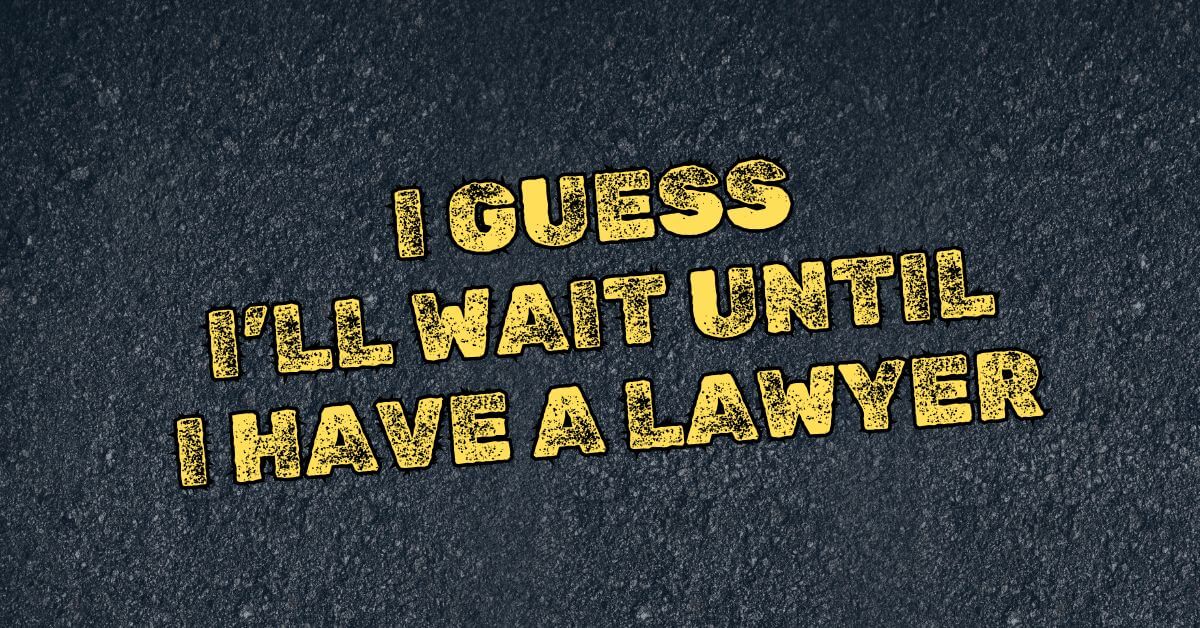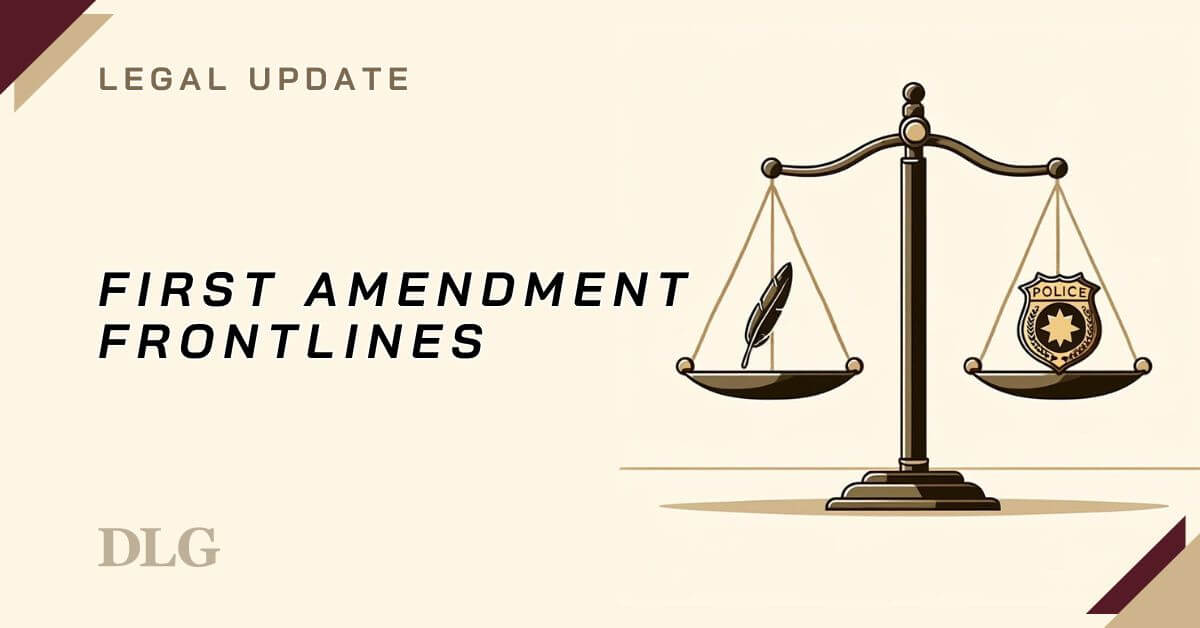In more recent times, groups of individuals, claiming to be “First Amendment Auditors,” have been challenging police and gaining media exposure by filming the inside of various public spaces. As a result of this new phenomenon, many agencies are evaluating how to respond to these so-called “auditors.” Many of these encounters do not escalate, however, there are some encounters that have become challenging for law enforcement.
In our second week, we will review what actions Law Enforcement can take moving forward. In part one, we reviewed what rights citizens have under the First Amendment and two cases that have affected law enforcement. From these cases we learned that many of the U.S. Circuit Courts of Appeal and the U.S. Department of Justice have ruled that citizens have the First Amendment right to film police performing their duties in public and that there are certain restrictions that outweigh a citizen’s right to film, such as public safety and when statutes and other laws outweigh First Amendment Rights. To review, a First Amendment audit is a form of activism where an individual seeks to exercise their First Amendment rights. The audits can take in public spaces such as libraries, post offices, beaches, town halls, police and sheriffs’ departments, and others. The crux of the audits focuses on the “auditors’” right to openly film law enforcement personnel and other public officials.
So, let’s review what we can do moving forward.
Constitutional Strategies for Law Enforcement
Agencies must be prepared to deal with these auditors in a constitutionally-sound manner. As a result, agencies should review their applicable policies to ensure that they pass constitutional guidelines and focus on providing training to officers relative to those policies, while also adequately supervising personnel to ensure compliance. In particular, agencies should consider the following constitutionally-sound strategies:
- Maintain courtesy, respect, and be tactful.
- Remember that most agency’s rules and regulations provide something to the effect of “Officers shall not be discourteous or inconsiderate to the public, to their superior officers, and to their fellow officers and employees of the Police Department as well as other law enforcement and governmental agencies. They shall refrain from the use of profanity, derogatory comments, ethnic or racial slurs or any other type of demeaning statements or comments. They shall be tactful in the performance of their duties and are expected to exercise the utmost patience and discretion even under the most trying circumstances.”
This requirement applies to nearly everything that officers do and is not necessarily specific to only those encounters with First Amendment auditors. Because of this, officers should be reminded that this strategy should set the baseline for all encounters. It does not mean that officers must submit to every challenge, or otherwise jeopardize their safety or the safety of others, or not enforce applicable laws; rather, the goal is that by treating everyone with respect, most encounters can be resolved in as amicable of a manner as possible, even if arrest or charges result.
This can be particularly challenging when officers are faced with personal insults and derogatory comments. However, the courts have previously advised that “[i]n our society, police officers are expected to endure significant burdens caused by citizens’ exercise of their First Amendment rights”.[1]
- Never sacrifice officer safety or the safety of others.
- Officers are not required to ignore illegal activity.
- The Supreme Court ruled that the presence of probable cause for an arrest defeats a First Amendment retaliatory arrest claim as a matter of law.[2] The mere fact that someone is recording does not forgive them of all criminal transgressions.
- Pay attention to behavior and conduct – not necessarily the recording itself.
- Officers should remember that the mere fact that someone is recording them does not immunize them from being charged with their criminal acts. If someone is committing a crime or violation, officers can take the appropriate action in connection with that conduct or behavior. Frequently officers run into an issue when they focus on the act of recording itself. However, officers should be careful to pay attention to the conduct and behavior of the person recording them. For instance, if someone is committing a disturbance, but they are recording, officers can take action to charge the individual with disturbing the peace but should be sure to make it clear in the police report what conduct and behavior the person was engaged in, apart from simply saying they were recording to justify the charge.
- Reasonable, contemporaneous orders may incidentally restrict recording.
- The Gericke case is important because it suggests that police can restrict individuals filming law enforcement while performing law enforcement duties if a reasonable officer would believe safety is at risk. When the Court issued its ruling in Glik, most citizens assumed that they could film police performing public duties without any limitations. Gericke highlights that citizens can film police officers carrying out their duties, even during a traffic stop, unless a police officer can reasonably conclude that the filming is interfering with police duties.
If an officer has a safety concern about him/herself or others based upon the conduct or behavior of the person recording them, then the officer can certainly order the person to move from the immediate area to an area from which they can safely record. For instance, using the fact pattern in the Gericke case, it would be reasonable for the officer to have ordered Gericke to move into the parking lot so she could safely record from that location. Likewise, in the situation discussed above where the local politician recorded and challenged officers during the course of a motor vehicle stop, it was reasonable for those officers to order her to move onto the sidewalk. In that situation, the officers specifically advised the politician that since the car was being towed, a tow truck would be arriving shortly, and they wanted to ensure her safety while vehicles were moving. In such instances, the officers’ order should not address the recording itself, meaning that the appropriate order is not, “Stop recording.” Rather, the appropriate order would be something along the lines of, “You can continue to record, but you need to move onto the sidewalk in order to ensure your safety since there are moving vehicles on the roadway.”
- Provide identification upon request.
- In instances where an individual requests that officers identify themselves, officers should politely provide their name and badge number (or other identifying number). There may be times, however, when this is not reasonable, practical, or safe.
- Consider speaking with witnesses, complainants, and victims privately.
- Many officers are concerned about the privacy implications of having First Amendment auditors present in the department lobby when witnesses, complainants and victims come in to discuss sensitive matters. It is important for those individuals to feel safe, and it is best advised that in all circumstances, they be escorted to an area where a private conversation can be had. Many departments are equipped with a room where officers or investigators can meet with witnesses, complainants and victims, and those areas should be utilized to ensure privacy and confidentiality.
- Attempt to diffuse the situation.
- Officers should always attempt to avoid a situation from escalating where an officer might feel compelled to make an arrest. Remember, the most important attribute of any police officer is their ability to communicate and to diffuse a situation.
- Be careful when seizing and searching cell phones.
- The United States Supreme Court ruled in Riley v. California and U.S. v. Wurie that absent exigent circumstances, police cannot search the digital evidence contained in a cellular phone incident to arrest.[3] Some of the exigencies could include the need:
- to prevent the imminent destruction of evidence in individual cases,
- to pursue a fleeing suspect, and
- to assist persons who are seriously injured or are threatened with imminent injury.
- The Court also held that “in light of the availability of the exigent circumstances exception, there is no reason to believe that law enforcement officers will not be able to address some of the more extreme hypotheticals that have been suggested:
- a suspect texting an accomplice who, it is feared, is preparing to detonate a bomb, or
- a child abductor who may have information about the child’s location on his cell phone.”
- Consult your legal advisor.
- For specific guidance on First Amendment auditors in each jurisdiction, agencies should consult their legal advisors.
Takeaways
We’ve learned a lot over the past two weeks, so let’s outline it all for you:
- A First Amendment audit is a form of activism where an individual seeks to exercise their First Amendment rights. The audits can take in public spaces such as libraries, post offices, beaches, town halls, police and sheriffs’ departments, and others. Law enforcement should be prepared to deal with First Amendment “Auditors” and they constitutionally have a right to film law enforcement at certain times.
- Many of the U.S. Circuit Courts of Appeal and the U.S. Department of Justice have ruled that citizens have the First Amendment right to film police performing their duties in public (such as in Glik).
- There are restrictions that outweigh a citizen’s right to film, such as public safety and when statutes and other laws outweigh First Amendment Rights (such as in Gericke).
- Never sacrifice officer safety or the safety of others and you are not required to ignore illegal activity.
- Maintain courtesy and respect as a baseline in everything you do.
- Always attempt to diffuse the situation.
- Pay attention to behavior and conduct – not necessarily the recording itself.
- Provide identification upon request.
- Consider speaking with witnesses, complainants, and victims privately.
- Absent exigent circumstances, police cannot search the digital evidence contained in a cellular phone incident to arrest.
As always, these legal updates are meant to be helpful but do not count as legal advice. If you have specific questions about First Amendment auditors in your jurisdiction, seek out a legal advisor. You can learn more about First Amendment Auditors and other First Amendment Implications by joining us at our First Amendment Summit. Click here to learn more and we hope to see you there.
Continue Your First Amendment Education
You can learn more about First Amendment Auditors and other First Amendment Implications by joining us at our upcoming First Amendment Summit live at Mohegan Sun.
[1] Glik, 655 F.3d at 84.
[2] Nieves v. Bartlett, 587 U.S. ___, 139 S. Ct. 1715 (2019).
[3] Riley v. California, 573 U.S. 373 (2014).



